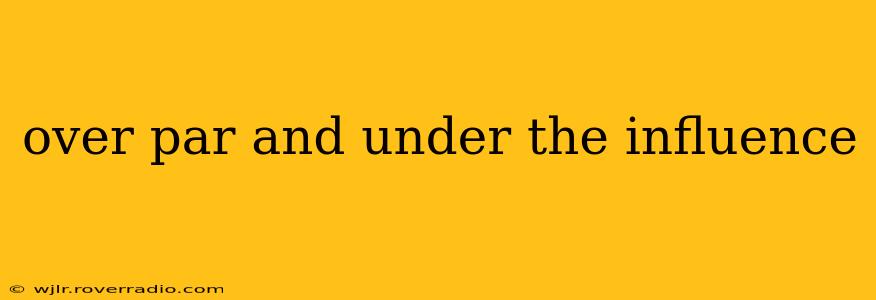Golf, a game of precision, strategy, and patience, often finds itself intertwined with social gatherings that include alcohol. While a celebratory drink after a round is common, the combination of "over par" and "under the influence" raises significant concerns regarding safety, etiquette, and the overall enjoyment of the game. This article delves into the complexities of alcohol consumption on the golf course, exploring its effects, the rules surrounding it, and strategies for responsible enjoyment.
What are the Rules Regarding Alcohol Consumption on a Golf Course?
This is a multifaceted question. There isn't a universally enforced rule prohibiting alcohol on golf courses. However, each course sets its own policy, ranging from outright bans to allowing alcohol only in designated areas (like clubhouses or restaurants). Many courses allow BYOB (bring your own beverage) while others only serve alcohol from their own facilities. The key is to check the specific rules of the golf course you're playing before consuming any alcohol. Ignoring these rules can result in penalties ranging from warnings to ejection from the course. Furthermore, public intoxication laws outside the course still apply. Always be mindful of legal limits and responsible consumption.
Is it Okay to Drink Before Playing Golf?
Drinking before a round of golf is generally discouraged. Alcohol impairs judgment, coordination, and reaction time – all crucial elements for a safe and enjoyable game. Even a small amount can affect your swing, leading to poor shots and potentially dangerous situations, especially if you're playing near other golfers. It’s far better to save any celebratory drinks for after the round when safety isn't a primary concern.
How Does Alcohol Affect Golf Performance?
Alcohol's impact on golf performance is multifaceted. It directly affects:
- Hand-eye coordination: Alcohol impairs fine motor skills, making it harder to control your club and accurately hit the ball.
- Balance and stability: This is crucial for maintaining a stable stance and executing a smooth swing. Alcohol compromises this, potentially leading to injuries or poor shots.
- Concentration and focus: Maintaining focus throughout a round is essential. Alcohol diminishes concentration, making it difficult to strategize and execute your shots effectively.
- Judgment and decision-making: Accurate club selection and course management require sound judgment. Alcohol can cloud your judgment, leading to poor decisions on the course.
What are the Safety Risks of Drinking and Playing Golf?
The most significant risk is injury, either to yourself or to others. Impaired coordination can lead to accidents with golf clubs, golf carts, or even stray balls. Furthermore, alcohol can heighten aggressive behavior, increasing the potential for conflicts on the course. Always prioritize safety and play responsibly.
Can I still enjoy a social game of golf with friends while avoiding excessive drinking?
Absolutely! Golf is a social game, and socializing doesn't require excessive alcohol consumption. Many golfers enjoy the camaraderie and friendly competition without needing alcohol to enhance their experience. Focus on the game, the company, and the beautiful surroundings. Consider non-alcoholic beverages, engaging conversation, and friendly banter as ways to foster a positive social atmosphere.
Conclusion: Responsible Golfing and Alcohol Consumption
The ideal scenario is to separate golf and excessive alcohol consumption. While a post-round drink can be a perfectly acceptable celebration, responsible consumption before, during, or excessively after the game should be prioritized. Always check the course's rules, respect your fellow golfers, and above all, ensure your safety and the safety of others. Remember, a great golf game should be memorable for your skill, not for an incident involving alcohol.
